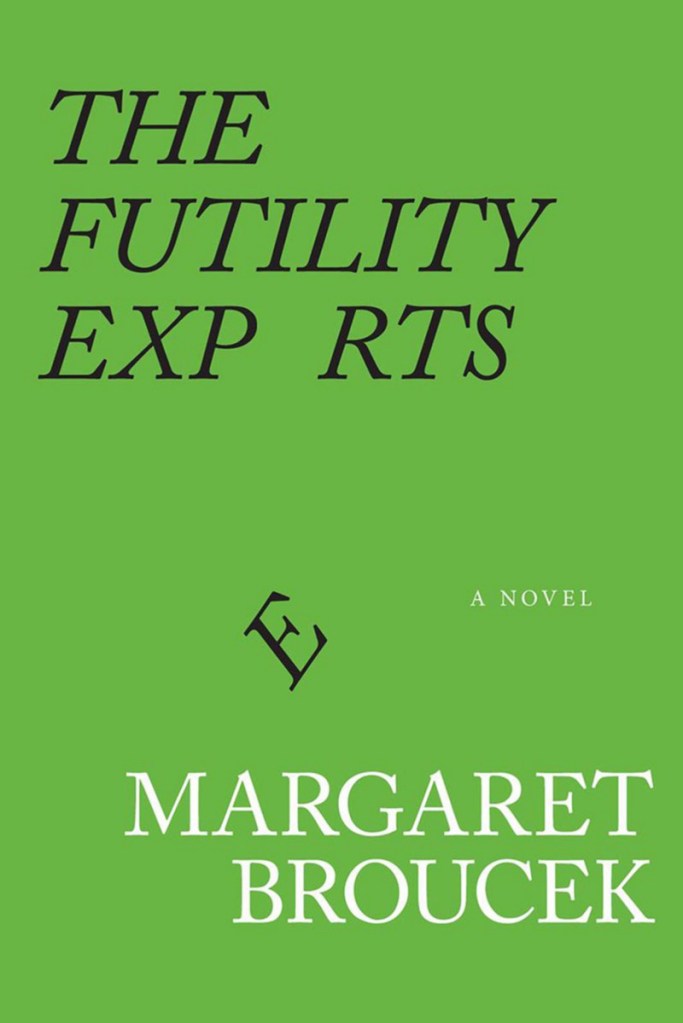With a deft absurdist touch and biting wit, Margaret Broucek details the fraught lives of a Marine sniper impersonator and a struggling teacher with a yen for cryptozoology.
Maine writers seem to have a penchant for lingering over insignificant actions or observations, then using them to whip the smallest aspirations into a baroque fantasy. The residents of Peter Bridgford’s “Kettle Cove” and, above all, Monica Wood’s wonderful “One in a Million Boy” come to mind. Some symbiotic alchemy between author and place (though definitely not Vacationland) seems to be at work. Which comes first, like the chicken’s egg, remains obscure, but it is working overtime in Margaret Broucek’s “The Futility Experts.”
Broucek is a Portland filmmaker and playwright who has also published short stories, but “The Futility Experts” is her first novel. The eponymous protagonists are two men – ably supported in their self-destructive drives by their extended families – who are oblivious of each other’s existence. They share, nevertheless, some common features, first and foremost a chasm between their real-life situation and the status to which they feel entitled.
Thus Tim, once destined to be fabulous tuba player, is now an office slave to the psychopathic publisher of a magazine for marching bands. Life at home – where the singing lessons his wife gives are the closest she can get to singing in an opera – is no better. If being on stage is too distant a goal, Mona wants most of all to buy a parking space for their “narrow brown clapboard two-story” in Malden, Massachusetts. Beset by responsibilities to his aging mother and his vacuous son, feeling inferior to his wife’s more successful friends, Tim attempts to solve his situation by taking on the persona of a 21-year-old Marine sniper in Afghanistan.
Meanwhile, in a university town somewhere not too far from Portland, Davis’s struggles to get tenure are being sabotaged by the antics of his very troubled daughter (adopted from a Romanian orphanage). Nor is he exactly helped by his real obsession, cryptozoology, the study of hidden or mythical beasts like the yeti. Sixteen years of protecting the outside world (teachers, friends, colleagues) from their daughter has left little room for love in his marriage. Davis and Jenny see Dr. Peggy, but only over the phone, strictly for advice on managing Megan. Impersonality reigns: In answering their questions, the therapist refers to them only as the Father and the Mother.
These, then, are the “futility experts.” Their story is told in alternating chapters entitled “Tim” and “Davis,” allowing the author to drop little hints that Tim’s and Davis’s separate worlds are just waiting to collide. It is tempting to see a connection in this antiphonal structure with Broucek, the short story writer. While none of the chapters is meant to stand alone, some of them do stand out as bleakly funny little cameos.
A pervasive claustrophobia presses down on all of them. Physical bounds – Tim’s house “boxed in by brick warehouses” – breed emotional limits: that “coveted” driveway – only a “two-car length strip” behind a bar – and Tim’s moment of fleeting triumph when for once he gets to park there: “I’m in our space.” When Davis and Jenny are in his office calling Dr. Peggy, even its thin walls are made oppressive by the voices outside.
Broucek is brilliant at making a short phrase ring until it captures a whole personality. A woman looks at a gleaming sports car and thinks it “would likely be the best dress she’d ever owned.” Davis finds the head of his department making notes, “with a fountain pen, for God’s sake.” When she describes Tim as “beached on his bed,” it’s fair to ask if, at a thousand words, the proverbial picture’s worth is inflated.
As well as a vivid way with words, Broucek has a wonderful gift for conceiving chaos and oddball situations and making them hilarious. In addition to Tim and Davis and their retinues, a cast of quirky secondary characters, all with their own problems, spin the plot out in ever more eccentric circles.
Ultimately, though, loopy episodes come so thick and fast that they overpower the narrative. The denouement, when it finally arrives, has become predictable and doesn’t seem worth all the trouble. As to the fretful lives at stake, by that time this reader was too confused and exhausted to care very much.
One plotline seemed incompatible with the humor, although dark, of the rest of the book. Without giving anything away, it is like a sleeper cell, risky but hiding in plain sight from the start. When it is activated, the awful result is treated with a glibness that I suspect even the author was uncomfortable with. At least, instead of resolving the issue, she just lets it evaporate.
Chapter for chapter, there is much to enjoy in “The Futility Experts.” The whole, however, is less than their sum.
Thomas Urquhart is a former director of Maine Audubon and the author of “For the Beauty of the Earth.”
Send questions/comments to the editors.



Success. Please wait for the page to reload. If the page does not reload within 5 seconds, please refresh the page.
Enter your email and password to access comments.
Hi, to comment on stories you must . This profile is in addition to your subscription and website login.
Already have a commenting profile? .
Invalid username/password.
Please check your email to confirm and complete your registration.
Only subscribers are eligible to post comments. Please subscribe or login first for digital access. Here’s why.
Use the form below to reset your password. When you've submitted your account email, we will send an email with a reset code.